





The economy of the United Kingdom is enjoying some of the most flourishing times ever. It has recently reached the lowest unemployment rate since the 70s.
The UK market has developed quickly over the years and so has its GDP which is one of the largest in the world and it is ranked 22nd when it comes to GDP per capita.
London possesses one of the world’s leading financial centres.
According to the estimates of 2019, the UK had a nominal GDP of $2.83 trillion and GDP based on purchasing power parity of $3.13 trillion. In 2018, the country had a nominal GDP per capita of $44,177 and GDP per capita on purchasing power parity of $45,643.
Statistic – Fact
To many, this is none of a surprise however there are many people out there including salesmen, tradesmen or just business executives who might wonder which industries are the largest ones in the United Kingdom, which are the most profitable and which ones are growing faster.
In this article, we will show you:
- The largest industries in the United Kingdom
- Top largest British companies by revenue
E Commerce is the largest industry in the United Kingdom with 586 billion pounds in 2017
Statistic – Fact
Largest industries in the United Kingdom
Distribution of GDP across the main three economic field: agriculture, industry and services.
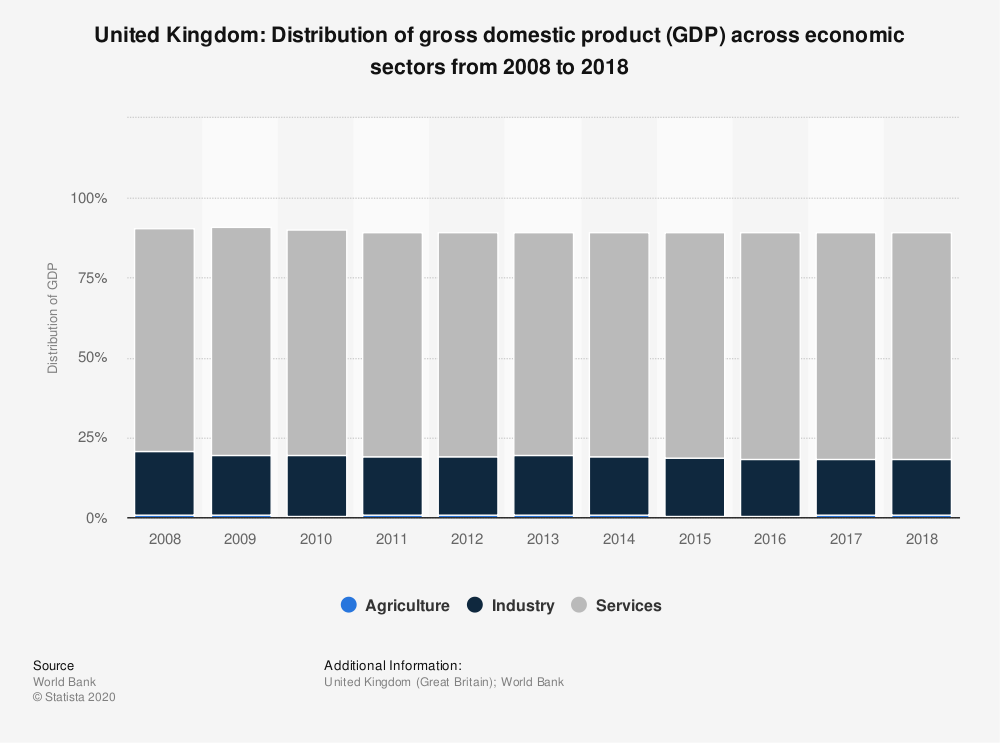

Finance

- £132 billion to the UK economy
- 6.9% of total economic output
- 24,000 people employed
In 2018, the financial services including banking and insurance-related businesses sector contributed £132 billion to the UK economy, 6.9% of total economic output.
The United Kingdom is the largest financial hub in the European Union as its assets are worth almost £4 trillion. There are over 24,000 people employed directly by the industry.
Insurance companies employ around 300,000 people. The sector contributed £29 billion in tax in the UK in 2017/18. Some of the largest financial companies in the world such as Deloitte, Ernst & Young (EY). KPMG, PricewaterhouseCoopers (PwC) has offices in London where they employ thousands of people.
Although it might seem at first sight that due to Brexit many jobs in the financial sector will be cut.
According to an article in the Financial Times (April 2019), less than 1,500 jobs have been moved from the UK to other EU countries.
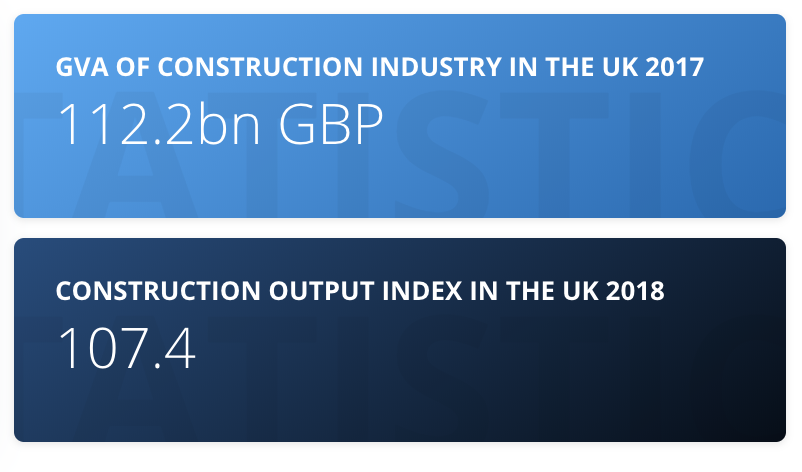

2. Construction

- 1m direct jobs
- Annually adds £138bn+ to the UK economy
- 6,4% of the total economic output
The construction sector is one of the major pillars in the British economy, contributing to most jobs and largest gross value added to the country. Needless to say that when construction suffers, the entire economy will follow suit.
The construction industry, including contracting, manufacturing and professional services, revenue was £370 billion in 2016, adding £138 billion in value to the UK economy – 9% of the total.

Agriculture
- the agriculture industry in the UK contributed £9,5 billion
- 0.51% to the national economy (Gross Value Added)
- around £9.5 billion of Gross Value Added

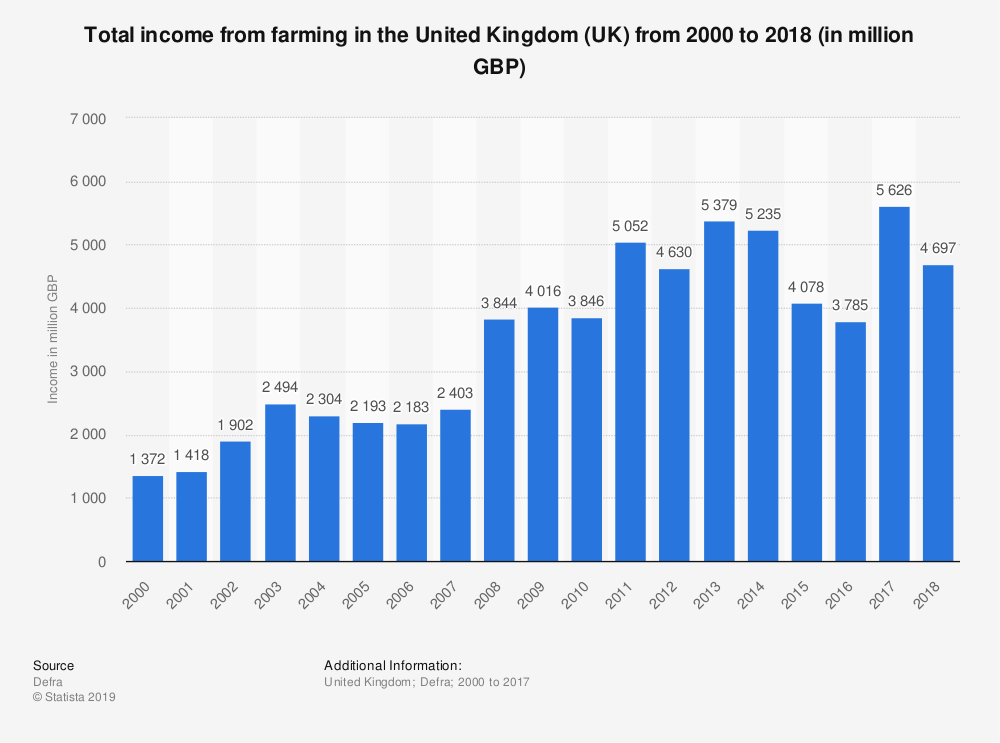
Farming like in any other country plays a crucial role in the overall economy.
According to the Office for National Statistics, the agriculture industry in the UK contributed £9,548 million or 0.51% to the national economy (Gross Value Added), a decrease of £651 million (6%) on the year compared to 2017.
In spite of experiencing a drop of over 900 million pounds from 2017 to 2018, the industry, in general, is in good shape and its contribution to the country’s economy is vital.
According to the Office for National Statistics, the agriculture industry in the UK contributed £9,548 million
Overall, agriculture contributed around £24 billion of revenues and around £9.5 billion of Gross Value Added to the UK economy in 2018.
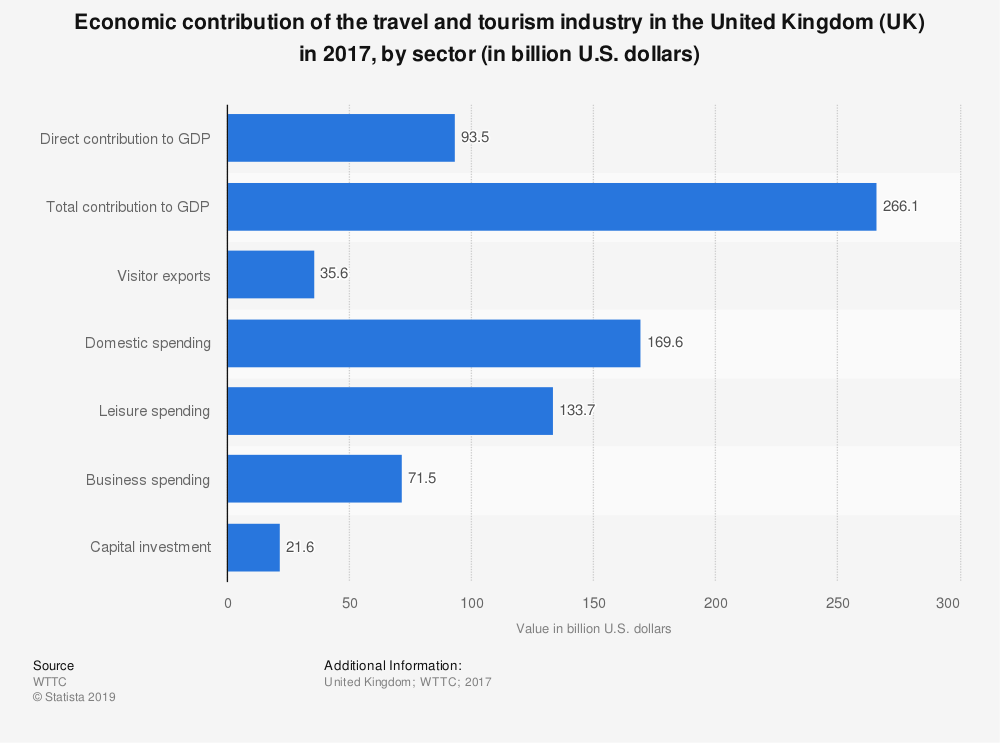

Tourism

- £93 billion to the UK economy
- 6.9% of total economic output
- 33,000 people employed
UK tourism enjoys a great time, just in 2018 over 37 million people visited the country added 22.9 billion pounds to the economy.
And in 2017 the UK ranked seventh in the UNWTO international tourist arrivals league. The UK accounted for 2.8% of global arrivals in 2017.
Experts estimate that the British tourism industry will be worth over 257 billion by 2025 and will contribute to about 10% of the country’s GDP. It will employ almost 3.8 million people. Tourism’s impact is amplified through the economy, so its impact is much wider than just the direct spending levels.
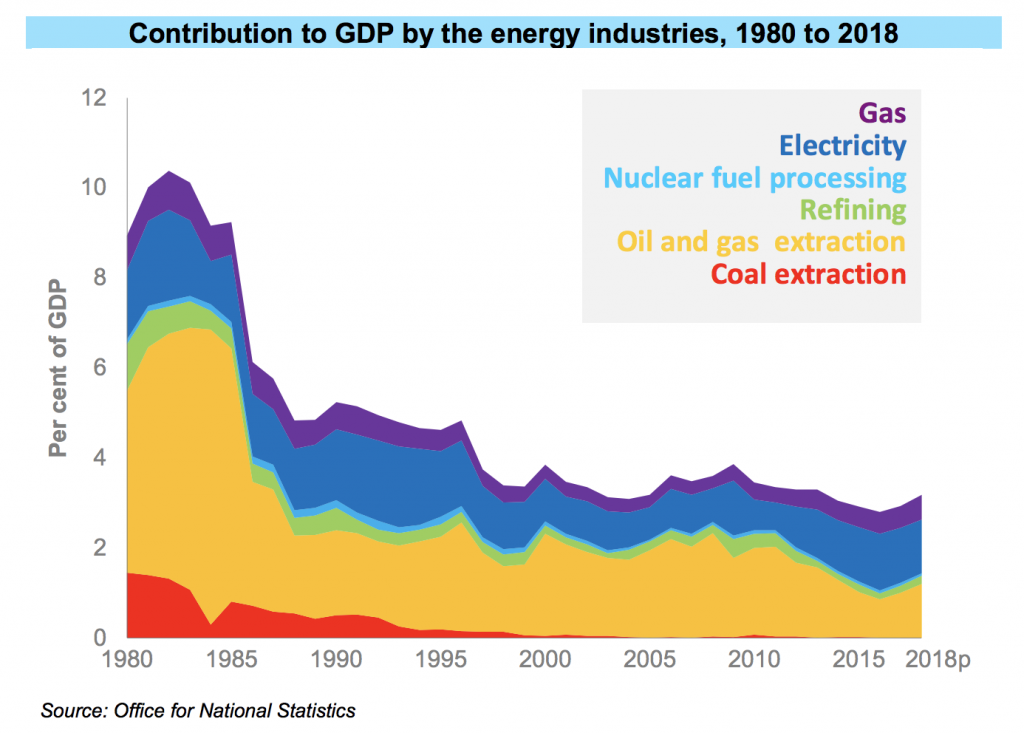

Energy
employs around 179,000 people
3.2% of GDP
Energy is one of the largest industries in the United Kingdom and it is expected to increase in size substantially within the next few years. An industry that employs indirectly around 450,000 people – almost half of those jobs are located in Scotland.
Although the industry contribution to the British economy has dropped largely, it is expected to still generate more employment.
According to PwC, the industry will generate a further 120,000 jobs in the gas and oil industries.
Within the energy industry, renewable energy and low carbon businesses accounted for over 44 billion pounds and employed an estimated 209,500.

Manufacturing

- employs 2.7 million people – earning an average of £32,500
- accounts for 45% of total exports – totalling £275bn
- contributes 10% of GVA
Since the first industrial revolution, the United Kingdom manufacturing industry carried a lot of importance in the economy. In 2009, the manufacturing industry was the country’s third-largest sector and accounted for over 11% of the total GDP and employed 8% of the people.

Media
1. Worth over 68 billion pounds in the United Kingdom
2. Employs indirectly an estimated 2,040,000 people
Statistic – Fact
The media industry including film, music and entertainment is worth over 68 billion pounds in the United Kingdom.
It is currently undergoing a bonanza period and it is expected to experience a big growth up to £80 billion per year within the next few years (please see graph below).

Experts predict that the media market will continue to grow by £8 billion over the next four years, making the UK the second largest market in Europe, the Middle East and Africa (EMEA), after Germany.
Within the media industry, the UK is now Europe’s largest video games market and podcast listeners in the UK are to grow 29 per cent year-on-year to reach 27 million by 2022.
The media industry employs an estimated 2,040,000 people – with the majority of them being located outside London.

Steel

- 30,000 direct jobs
- Annually adds £9.5bn to the UK economy
- 54% of UK Steelworkers work in Yorkshire and the Humber, or Wales
The steel industry contributes £1.6 billion, 0.1% of the UK economy and 0.7% of manufacturing output. Some of the largest steel companies in the country are Barrow Hematite Steel Company, Blaenavon Coal and Iron Company and Bridon Ropes, British Steel Limited.
However, there are over 600 businesses involved directly or indirectly in the process of producing and manufacturing steel-related products and services which ultimately employs around 32,000 people, totalling 0.1% of the employed people. In 2016, the UK produced 8 million tonnes of steel

Fashion
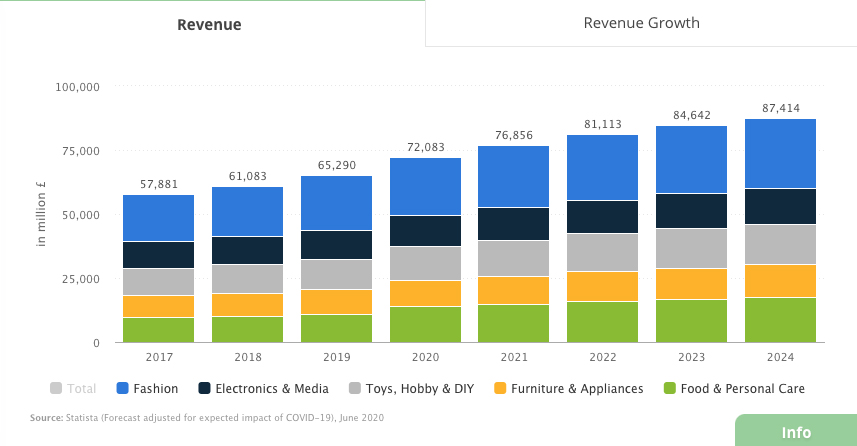
The fashion industry in the United Kingdom might have struggled over the last few years when it comes to brick and mortar stores however, overall, it has experienced steady growth. Currently, it employs about 55,000 people and it contributes 5-4% to the national GDP.
According to Caroline Rush from the British Fashion Council, the UK fashion industry has hit a record £32 billion a year.
Within the fashion industry, eCommerce deserves a special mention as it has
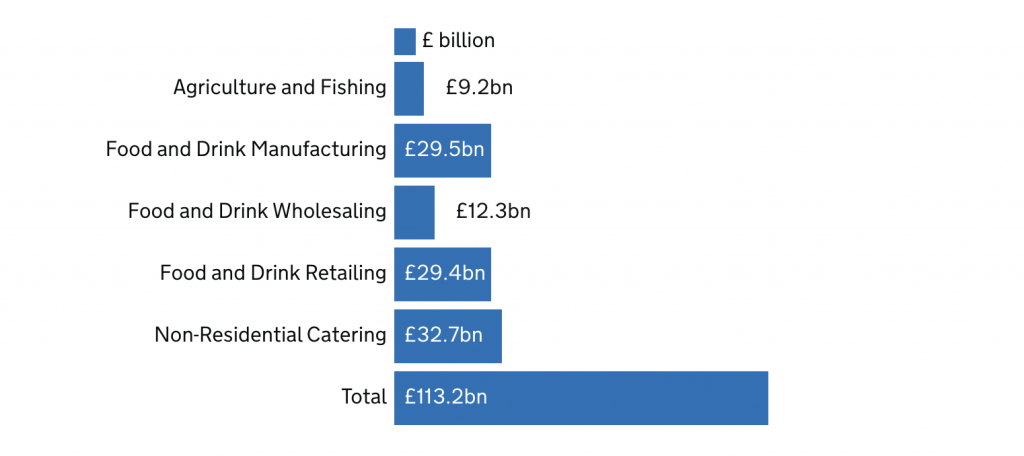

Food

- 400,000 direct jobs
- Annually adds £21.9bn to the UK economy
- 6.4% of national Gross Value Added
Overall, the agri-food sector, including wholesale, manufacturing and retailing totalled over £113 billion or 6.4% of national Gross Value Added.
This represented an increase of 2.7% from 2015 which also enjoyed a 3.9% rise. Currently, it employs around 400,000 people across the country and it is crucial to the prosperity of the country.
Food and drink manufacturing accounts for 29.5 billion whereas retailing is responsible for almost 30 billion a year. Non-residential catering possesses the largest chunk in the market with over 32 billion of revenue a year.
Longer-term, the food sector (excluding agriculture and fishing) increased by 78% between 2000 and 2016 while the whole economy increased by 80%.
Top British companies by revenue

We are Top Media, an advertising agency in London focused on creative and effective advertising.
Sources:
Agencia de comunicacion corporativa





You’ve missed off the Creative Industries, which contributes significantly more than a lot of those listed. Is there a reason for this?
Hi Heggs, thanks for pointing that out. On my first draft, I did include the Creative Industries, however, in the end, I decided to drop it as it seemed to me that it could be a bit confusing for certain audiences as by definition the creative industry include the following: advertising, architecture, art, crafts, design, fashion, film, music, performing arts, publishing, R&D, software, toys and games, TV and radio. I opted for breaking it down into more categories such as fashion and media. It could be categorised as such. It was just a personal choice and I thought It could be easier to understand this way.
I like the valuable info you provide in your articles. I’ll bookmark your weblog and check again here frequently. I’m quite certain I will learn many new stuff right here! Good luck for the next!